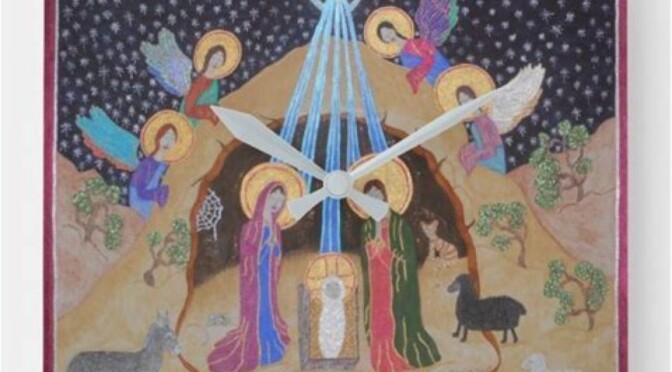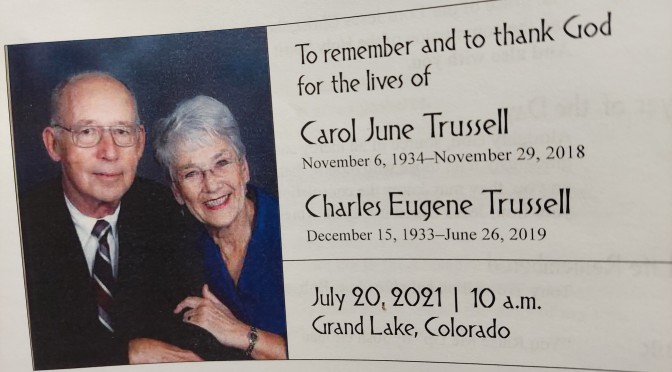“Bless the Years” worship is a mid-week Advent and Christmas service for our home-centered folks, their family, and friends to experience a calm, peaceful, and intimate time to welcome the Christ Child and celebrate the holidays
Caitlin Trussell with Augustana Lutheran Church on Thursday, December 9, 2021, 11 a.m.
[sermon begins after the Luke reading; Isaiah reading is at the end of the sermon.}
Luke 2:1-20 In those days a decree went out from Emperor Augustus that all the world should be registered. 2This was the first registration and was taken while Quirinius was governor of Syria. 3All went to their own towns to be registered. 4Joseph also went from the town of Nazareth in Galilee to Judea, to the city of David called Bethlehem, because he was descended from the house and family of David. 5He went to be registered with Mary, to whom he was engaged and who was expecting a child. 6While they were there, the time came for her to deliver her child. 7And she gave birth to her firstborn son and wrapped him in bands of cloth, and laid him in a manger, because there was no place for them in the inn.
8In that region there were shepherds living in the fields, keeping watch over their flock by night. 9Then an angel of the Lord stood before them, and the glory of the Lord shone around them, and they were terrified. 10But the angel said to them, “Do not be afraid; for see—I am bringing you good news of great joy for all the people: 11to you is born this day in the city of David a Savior, who is the Messiah, the Lord. 12This will be a sign for you: you will find a child wrapped in bands of cloth and lying in a manger.” 13And suddenly there was with the angel a multitude of the heavenly host, praising God and saying,
14“Glory to God in the highest heaven,
and on earth peace among those whom he favors!”
15When the angels had left them and gone into heaven, the shepherds said to one another, “Let us go now to Bethlehem and see this thing that has taken place, which the Lord has made known to us.” 16So they went with haste and found Mary and Joseph, and the child lying in the manger. 17When they saw this, they made known what had been told them about this child; 18and all who heard it were amazed at what the shepherds told them. 19But Mary treasured all these words and pondered them in her heart. 20The shepherds returned, glorifying and praising God for all they had heard and seen, as it had been told them.
[sermon begins]
My Grandma Ruth was one of my favorite people. I loved spending time with her. At 13 years old, she was taken by her parents to live at an orphanage. She met my grandfather when they were both college students. She was very tall and gentle and cozy. Being the town librarian, she was also very wise. When I was little, I thought Grandma Ruth knew everything. She certainly knew the importance of books and reading. She taught us to love being at the library, passing time in the smell of the books, the quiet, the endless stories and information. Looking back, Grandma Ruth taught me so many things. She taught me was what patience and perspective looked like when time seemed like the enemy. I don’t remember how old I was when I broke one of her special porcelain angles from Heidelberg, Germany. I also don’t remember how it all happened. Knocked over, the angel was suddenly armless. I don’t even remember Grandma Ruth’s reaction. I only ever remember being loved by her. After both she and Granddad died, my older brother and sister went back to help my aunt work on the house. My sister called to ask me if I wanted anything from the house and my only request was for her two Heidelberg angels. Unwrapping the angels and seeing the one with her arms glued back on sent me back in time. Something so long ago seemed like yesterday. Time is funny that way.
Our gospel writer this morning knew a thing or two about telling time. Luke’s “orderly account” of the good news often includes time markers like the one we heard today:[1]
In those days a decree went out from Emperor Augustus that all the world should be registered. This was the first registration and was taken while Quirinius was governor of Syria.[2]
Luke then tells us about Mary and Joseph arriving in Bethlehem to be registered just in the nick of time to have the baby Jesus. In our mind’s eye, we can see the story unfolding into the night with angels shining bright over shepherds who wasted no time racing to the manger-side to see the baby for themselves. Time is of the essence. This is “good news of great joy for ALL the people” so the story needs as many people to tell it as are willing to tell it through the generations.[3] Because this story is a person-to-person story – from the angel to the shepherds and so on. In fact, it was a person-to-person story from way before Jesus’ birth too. From imperfect person to imperfect person, the story was passed. Both the Gospel of Luke and the Gospel of Matthew include genealogies that go waaaaay back in time, linking Jesus through his adoptive father Joseph to sinful and repentant King David, and then even further back to flawed and faithful Father Abraham.
You see, this good news didn’t come out of nowhere. It’s good news that expands the circle of God’s promises each time to include even more imperfect people across time. God’s promise never shrank to exclude. God’s promise grew outward to include. As the angel said, “Good news of great joy for all the people.” The generations that led to Jesus carried God’s promise across time and finally into time for everyone. In Luke, the time of Jesus’ birth was marked and celebrated.
Christmas time makes me wonder about the ways we mark and celebrate time…and even grieve time. I can’t count the number of people who have lived many decades and who’ve said to me, “I feel the like the same person on the inside as I’ve always been,” while the mirror tells them a different story about time. Our bodies certainly mark time for us even when we may not be paying attention to time passing. But while that transformation is happening, things happen in real time that must be grieved and others that must be celebrated. In fact, the time we spend in grief often makes the times of celebration even more precious. Advent and Christmas are often bittersweet because grief and celebration intertwine, becoming rich, complicated emotions with the gift of perspective. Grandma Ruth wasn’t the only one to have that gift. Even so, each of us remain a work in progress. Flawed and imperfect and in need of a Savior, we’ve become tellers of the good news of great joy for all the people passed down from the angel through the generations.
We are tellers of the good news because we were first receivers of the good news.
Good news of the Wonderful Counselor who calms the troubled mind.
Good news of the Prince of Peace who brings peace through non-violence in our troubled world.
Good news of the Mighty God who challenges the status quo promising liberation.
Good news of the Everlasting Father whose promises are so inclusive and radical, that this tiny Messiah in a manger will grow up to hang from a cross, reassuring us that God suffers with us when we suffer grief and pain.
Good news of a Savior who promises new life out of the hot mess you’ve made of yours.
Good news of a God who empties tombs, welcomes all to eternal life, and holds your fragile moments of faith and doubt, reassuring you that there is nothing you can do or not do to make God love you any more or any less.
In real time and in unexpected places like the manger of communion bread and wine, Jesus’ presence is promised to you as a gift of grace today. You are receivers of the good news, and you have first been loved by the One who is Good News. It’s always a good time to celebrate Christmas. Thanks be to God and amen.
________________________________
[1] Luke 1:3
[2] Luke 2:1-2
[3] Luke 2:10
_________________________________
Isaiah 9:2-7 The people who walked in darkness
have seen a great light;
those who lived in a land of deep darkness—
on them light has shined.
3You have multiplied the nation,
you have increased its joy;
they rejoice before you
as with joy at the harvest,
as people exult when dividing plunder.
4For the yoke of their burden,
and the bar across their shoulders,
the rod of their oppressor,
you have broken as on the day of Midian.
5For all the boots of the tramping warriors
and all the garments rolled in blood
shall be burned as fuel for the fire.
6For a child has been born for us,
a son given to us;
authority rests upon his shoulders;
and he is named
Wonderful Counselor, Mighty God,
Everlasting Father, Prince of Peace.
7His authority shall grow continually,
and there shall be endless peace
for the throne of David and his kingdom.
He will establish and uphold it
with justice and with righteousness
from this time onward and forevermore.
The zeal of the Lord of hosts will do this.



![Ask the Complicated Questions [OR A Sermon for Reformation Day] John 8:31-36](http://caitlintrussell.org/wp-content/uploads/2021/10/mumeration-of-starlings-1-672x372.jpg)
![A Sermon for Mental Health Sunday – Mark 10:[32-34]35-45](http://caitlintrussell.org/wp-content/uploads/2021/10/mental_health_rep_imagejpg_by_Unsplash-672x372.jpg)

![Disagreement by Design [OR Labor Day as a Call to Love] Mark 7:24-37 and James 2:1-10, 14-17](http://caitlintrussell.org/wp-content/uploads/2021/09/unity-by-joanne-holbrook-672x372.jpg)

![The Finish Line Keeps Moving [OR Breaking News: Naps and Snacks for Grownups are Biblical!]](http://caitlintrussell.org/wp-content/uploads/2021/08/eternal-nap-roland-kay-sermon-caitlin-trussell-672x372.jpg)
![Being Human and Divine Being [OR Jesus Would Have Made a Great Nurse] John 6:24-35, Exodus 14:2-4, 9-15, and Ephesians 4:1-16](http://caitlintrussell.org/wp-content/uploads/2021/08/The-Nurse-by-Jose-Perez-Oil-on-Canvas-672x372.jpg)
